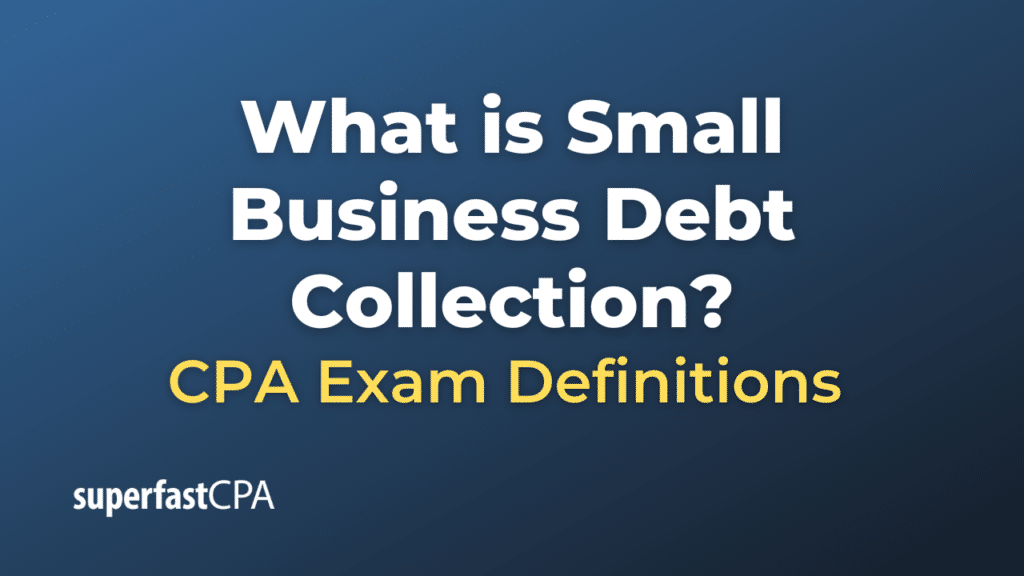Small Business Debt Collection
Small business debt collection refers to the process by which small businesses pursue the recovery of money that is owed to them by customers, clients, or other businesses. Unlike larger corporations that may have in-house collections departments or resources to hire large collection agencies, small businesses often have to be more strategic and careful about their debt collection efforts, both to preserve customer relationships and to remain compliant with relevant laws and regulations.
Here are some key aspects of small business debt collection:
- Invoices and Payment Terms: Before collection even becomes an issue, it’s crucial for small businesses to have clear payment terms outlined in invoices, contracts, or agreements. This clarity can prevent misunderstandings and provide legal backing if collection becomes necessary.
- Payment Reminders: Before turning to aggressive collection methods, small businesses usually send reminders about upcoming or past-due payments. This can be in the form of letters, emails, or phone calls.
- Collection Agencies: If in-house efforts are unsuccessful, a small business might hire a third-party collection agency to recover the debt. These agencies will charge a fee or a percentage of the collected amount.
- Legal Action: As a last resort, a small business might pursue legal action to collect a debt. This is typically pursued when the owed amount is substantial, and other collection efforts have failed.
- Debt Sale: Some businesses might choose to sell their debt to a debt buyer for a fraction of the owed amount. This means the business gets some immediate cash, but usually much less than what’s owed. The debt buyer then attempts to collect the full amount.
- Impact on Business Relationship: Small businesses, given their scale, often have close ties with their customers or clients. Aggressive debt collection can strain these relationships, so it’s essential to balance the need for payment with the desire to maintain good business relationships.
- Regulatory Compliance: The Fair debt collection practices Act (FDCPA) and other laws regulate debt collection practices to protect consumers from abusive, deceptive, or unfair collection practices. While the FDCPA primarily applies to third-party collectors, small businesses should be aware of and adhere to its principles to maintain ethical practices.
- Documentation: Keeping detailed records of all interactions related to a debt (e.g., invoices, payment reminders, email correspondence) is crucial. It can provide a clear trail of communication attempts and can be essential if legal action becomes necessary.
- Alternative Payment Plans: In some cases, it might be beneficial for a small business to offer an alternative payment plan or a settlement to a debtor. This can help recover at least a portion of the owed amount and maintain a positive business relationship.
It’s crucial for small businesses to approach debt collection with a mix of persistence, empathy, and professionalism. Each situation might require a tailored approach, balancing the need to keep cash flows healthy with the importance of preserving business relationships.
Example of Small Business Debt Collection
Let’s consider a fictional scenario to illustrate the process of small business debt collection:
Jane’s Boutique, a small retail clothing store, provided custom clothing to Eventful Planners, a local event planning company, for a large event they were organizing. The total for the clothing came to $5,000. According to the agreement, Eventful Planners was to pay within 30 days of receiving the invoice.
However, 45 days have passed, and Jane’s Boutique has not received any payment.
Steps Taken by Jane’s Boutique:
- Initial Invoice: The invoice sent to Eventful Planners was clear about the payment terms – a total of $5,000 due within 30 days.
- Payment Reminder: After the 30-day mark passed without payment, Jane’s Boutique sent a friendly email reminder to Eventful Planners, pointing out the overdue payment and requesting it be settled at the earliest.
- Follow-up Call: After another week without payment, Jane personally called the accounts department at Eventful Planners. She was told there were some internal delays but was assured the payment would be made soon.
- Second Reminder: Two weeks later, still without payment, Jane’s Boutique mailed a formal letter to Eventful Planners reminding them of the outstanding debt, stressing the importance of settling it to maintain their business relationship.
- Collection Agency: After 60 days with no payment, Jane decided to involve a small business collection agency. The agency agreed to take on the debt for a fee of 20% of the collected amount.
- Negotiation: The collection agency contacted Eventful Planners and, after some discussions, found out that the event planning company faced unexpected losses from the event. Recognizing the situation and in an attempt to preserve business relationships, they negotiated a settlement. Eventful Planners agreed to pay $4,000 over two installments in the next two months.
- Settlement: Eventful Planners made the two payments as agreed. From the collected $4,000, Jane’s Boutique paid the agency $800 (20%), leaving her with $3,200.
In this example, Jane’s Boutique didn’t receive the full amount, but through negotiation and involving a collection agency, they were able to recover a substantial portion of the debt. The approach taken was methodical, escalating only when previous efforts didn’t yield results. Throughout the process, the emphasis was on maintaining a professional demeanor and preserving the business relationship.













